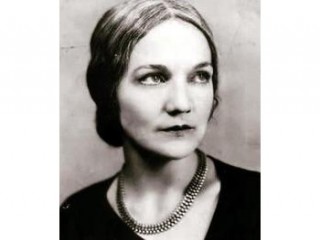
Katherine Anne Porter biography
Date of birth : 1890-05-15
Date of death : 1980-09-18
Birthplace : Indian Creek, Texas, United States
Nationality : American
Category : Famous Figures
Last modified : 2011-09-01
Credited as : Writer, journalist, Ship of Fools
The works of Katherine Anne Porter, American writer, were characterized by delicate perceptions and painstaking craftsmanship.
Katherine Anne Porter was born on May 15, 1890, in Indian Creek, Texas. She was a descendant of Jonathan Boone, brother of Daniel Boone, and a cousin of O. Henry (Sidney Porter). After the death of her mother in 1892, Porter and her four siblings went to live with their paternal grandmother. After her grandmother died in 1901, Porter was sent to several convent schools in Texas and Louisiana.
In 1906 Porter ran away from school and got married; she was divorced 3 years later. In 1911 she went to Chicago to work on a newspaper. She returned to Texas in 1914 and worked briefly as an entertainer, singing Scottish ballads.
From early childhood Porter had been writing stories, an activity she described as the unifying passion of her life, but her writing career began with hackwork, chiefly book reviews and political articles. In 1917 she joined the staff of the Critic, a Fort Worth weekly newspaper, and in 1918-1919 worked for the Rocky Mountain News in Denver. She then moved to New York, where she resumed her hackwork, which included some ghost writing. During the 1920s she traveled often to Mexico, wrote articles about the country, and studied art. She also worked on a biography of Cotton Mather (never finished) and did some book reviewing.
Porter's first volume of stories, Flowering Judas (1930), impressed critics with its flawless, unobtrusive style, but the book sold modestly—a fate common to most short-story collections. The title story, a masterpiece, is set in Mexico and turns brilliantly on a character contrast: Braggioni, the fat, sensual, egotistical revolutionary, and Laura, the beautiful, sensitive, sexually frigid idealist who is a mere dilettante in the revolutionary cause. Porter's use of Christian symbolism gives density to this paradoxical study of power and beauty. The title echoes what she described as the theme of her lifetime: self-betrayal in all its forms.
Flowering Judas won a Guggenheim fellowship for Porter to study abroad, and after a brief stay in Mexico she sailed in 1932 from Veracruz to Bremerhaven (which provided the setting for a novel completed 30 years later, Ship of Fools). A second volume of stories, Hacienda (1934), and a short novel, Noon Wine (1937), followed her marriage in 1933 to Eugene Pressly, a member of the U.S. Foreign Service in Paris. After divorcing Pressly, she married Albert Russell Erskine, Jr., whom she divorced in 1942.
Pale Horse, Pale Rider (1942) consists of three short novels, including Noon Wine. The title work is a bitter, tragic tale of a young woman's love for a World War I soldier who dies of influenza. It further established Porter's place in American literature: the impeccable artist of meager output. The title story of The Leaning Tower and Other Stories (1944), set in Berlin, deals with the menace of Nazism. The Days Before (1952) is a collection of essays, chiefly critical.
Porter's only novel, Ship of Fools (1962), was an immediate best seller but drew mixed reviews. Based on Das Narrenschiff, Sebastian Brant's 15th-century moral allegory, it examines the lives of an international group of voyagers; their human folly thwarts their personal lives and blinds them as well to the incipience of German fascism.
Porter became widely acknowledged outside her native Texas, where she was considered the best author who ever hailed from the state, even supplanting her cousin, the author O. Henry (Texas Monthly, May 1997). Among her many writing honors were a Texas Institute of Letters fiction award for Ship of Fools, and a Pulitzer Prize for her Collected Stories in 1966.
Porter's early life in Texas fostered a distaste for the lack of rights for women and social injustice had spurred her to leave, and later became entwined in her writings. The state, which still revered cowboys and the old west, for years failed to accord her status. What local critics sometimes dismissed as overly "genteel, " outsiders termed "perfection of form and style" (Texas Monthly, May, 1997).
Porter chose the University of Maryland as site of her personal library, begun with donations of some personal papers (she had received a honorary degree from the university in 1966). In Texas, her childhood home in Kyle was turned into a museum, a smaller structure in reality than her later reminiscences.
But one of the more unusual bits of Porter memorabilia was claimed by the Southwestern Writers Collection at Southwest Texas State University in San Marcos. It was her typewritten recipe for a "genuine Mole Poblana, " Mexico's "National Dish, " she wrote, with chili and chocolate (Texas Monthly, January 1997). Apparently learned during two years living there, it was a testament to her exciting, nomadic life after her conversion to Catholicism and abandonment of an early, strict Protestant influence during childhood.
Porter died on September 18, 1980, at the age of 90, in Silver Spring, Maryland. Her ashes were buried at Indian Creek beside her mother's grave. However, her writing continued to live on. The Letters of Katherine Anne Porter were published a decade later.
















